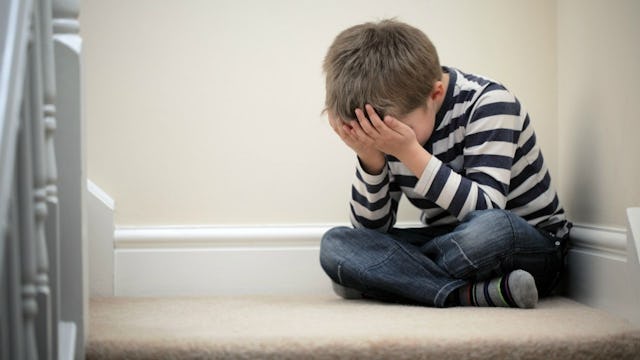Are We (Unintentionally) Setting Our Kids Up For Violence And Aggression?

The other day, before news of the tragic school shooting in Florida broke, I was reading a post in a parenting forum where several parents advocated for dealing with a toddler’s biting by biting the child back, or flicking them in the mouth, or feeding them hot sauce. Essentially, responses were being offered that take a developmentally appropriate – if frustrating – early childhood behavior (biting), and respond not with nurturing, teaching, or empathy; but with pain, punishment, and yes, violence.
It wasn’t much later that the news from Florida began to trickle in, and the images of teenagers hiding under their desks, evacuating their school with their hands raised, with each refresh of my browser reflecting a gradually increasing number of young lives lost. I spent that afternoon, like so many others did: reflecting upon the epidemic of violence we have yet to really confront in this country. The mass shootings. The domestic violence. The toxic masculinity. The rape culture.
I thought back to an afternoon five years ago, while I was pregnant with my son. I sat at my computer at work and watched my screen, tears rolling down my face, as news from Newton, Connecticut, consumed the country. I was eight months pregnant with my son and couldn’t believe that I was about to bring an innocent baby into a world where such horrors were possible. Now — five years later — I found myself experiencing the saddest sense of déjà vu as, six months pregnant with my daughter, I sat transfixed at my computer at work, watching more terrified children evacuate a school, past the bodies of their friends.
Five years have passed, and nothing has changed except the increasing frequency of these unspeakable acts of violence. Since then, more than 400 people have been shot in over 200 school shootings. And the question I have today for my fellow parents is this: can we really be surprised that we have so many violent, emotionally damaged people out there, inflicting their hurt onto others, when as a society we still hold on to beliefs that legitimize raising children in a way that subjects them to violence at the hands of their parents, from their earliest days?
I’m not saying something as banal as “if you spank your child, they’ll grow up to be a school shooter.” That’s obviously an over simplification, and inaccurate.
What I am saying is that, when we have an eighteen-month-old child, and they express their frustration with the only tools they have at their disposal — hitting, biting, or throwing a tantrum — and our response as their parents and their first teachers is to turn around and hit, bite, shame or degrade them, we are establishing a dangerous precedent.
We are, on the most fundamental level, showing them that the world is unsafe, that even their parents are unsafe; that expressing their emotions is unsafe, and that there is an automatic association between big feelings and inherent violence.
The toddler that you bite back becomes a three-year-old, made to stand in a corner for having an accident. That three-year-old becomes a six-year-old, spanked in front of his friends for making a mistake.
That six-year-old grows into a ten-year-old who knows what not to do in front of you to piss you off and earn a spanking, or a grounding…but that ten-year-old also has developed a knowledge of how to conceal misbehavior to avoid punishment, and what to do, and not to do, in order to protect themselves, rather than because of an inherent moral code that has been instilled in them through empathy, reasoning, and patient and responsive care giving.
That ten-year-old grows into a fifteen-year-old who is in high school and out of your sight all day; who has free will, a shit ton of hormones, more skills then you know, and access to materials and ideas that you haven’t even dreamt of. And then what?
I’m not here to say “don’t spank your kids.” I would love it if you didn’t, but I recognize that me saying that won’t change anyone’s fundamental beliefs about spanking. What I will say is that whether you spank or not, it is so important to understand that your child’s behavior, or misbehavior, is communication.
Kids aren’t just “bad.” They aren’t just trying to piss you off (even though it feels that way sometimes!). Everything they do has a message behind it. And when we spank, or ground, or punish, and consider that, alone, a resolution, we are missing the opportunity to connect with our kids. To find out what is wrong, and what they need to feel safe and healthy and supported.
When we take the time to connect with our children in these ways, whether they’re 2 or 12 or 20, we are teaching them how to regulate their emotions. How to talk through their problems. How to find other solutions beyond the impulse to lash out, and hurt someone as they’ve been hurt.
We keep arguing about the causes behind this terrifying epidemic of violence, while getting no closer to a solution. Some of us blame guns. Some of us blame mental health. Some of us blame media. We all blame one another. My challenge to you, as parents, is just to take a look at your kids tonight and consider how very new they are to this planet. How vulnerable they are, still — even your big kids.
Take some time to think about how you interact with them, and what messages you may inadvertently be sending to them through those interactions: about their self-worth, their safety; and about the confidence they’re developing in their world, and the caregivers they rely upon for safety and security.
Reflect upon how your reactions and your interactions influence your child’s view of the world. Because those actions can have a profound impact on who our children grow up to be.